Here are my favorite poems about weeds categorized:
- Short poems about weeds
- Poems about weeds in the garden
- Famous poems about weeds
- Inspirational poems about weeds
- Rhyming poems about weeds
So if you want the best poems about weeds, then you’re in the right place.
Let’s dig into it!
- 19 Mesmerizing Poems About Bluebells
- 31 Enchanting Poems About Cherry Blossoms
- 21 Intoxicating Poems About Lavender
- 163 Free-Spirited Poems About Wildflowers
- 69 Sublime Poems About Poppy Flowers
- 105 Exquisite Poems About Flowers
Satisfying Poems About Weeds
Embark on a captivating journey through a curated selection of the most enchanting poems about weeds, thoughtfully categorized for your immersive exploration.
Our collection uncovers works that delve into the resilience, beauty, and often overlooked allure of these humble botanical outcasts, challenging conventional perceptions and celebrating the tenacity of nature’s wild embrace.
With our handpicked assortment, you can now immerse yourself in a realm where words bloom and intertwine, inviting you to witness the hidden stories, overlooked grace, and unexpected virtues that reside within the world of weeds, all gathered in one place for your convenience.
Take a moment to wander through the mesmerizing verses that pay homage to these unsung heroes of the plant kingdom.
Keep reading and enjoy!
My #1 Favorite Poem About Weeds
From “Nature Poems” by Madison Julius Cawein
And the blossom that I chose
Soon lay dead and scattered.
Hard I found it then, ah me!
Hard I found the choosing;
Harder, harder since I’ve found,
All too hard, the losing.
Haply had I chosen then
From the weeds that tangle
Wayside, woodland, and the wall
Of my garden’s angle,
I had chosen better, yea,
For these later hours—
Longer live the weeds, and oft
Sweeter are than flowers.
Short Poems About Weeds
“The Weed” by Ella Wheeler Wilcox
A weed is but an unloved flower!
Go dig, and prune, and guide, and wait,
Until it learns its high estate,
And glorifies some bower.
A weed is but an unloved flower!
All sin is virtue unevolved,
Release the angel from the clod –
Go love thy brother up to God.
Behold each problem solved.
All sin is virtue unevolved.
“Spring” by Gerard Manley Hopkins
Nothing is so beautiful as spring—
When weeds, in wheels, shoot long and lovely and lush;
Thrush’s eggs look little low heavens, and thrush
Through the echoing timber does so rinse and wring
The ear, it strikes like lightnings to hear him sing;
The glassy peartree leaves and blooms, they brush
The descending blue; that blue is all in a rush
With richness; the racing lambs too have fair their fling.
What is all this juice and all this joy?
A strain of the earth’s sweet being in the beginning
In Eden garden.—Have, get, before it cloy,
Before it cloud, Christ, lord, and sour with sinning,
Innocent mind and Mayday in girl and boy,
Most, O maid’s child, thy choice and worthy the winning.
“Give Me the Poorest Weed” by Ethelwyn Wetherald
Give me the poorest weed
To satisfy my spirit’s need.
The brownest blade of grass
Will know and greet me when I pass.
Of their own feeling wrought,
They live like simple, vital thought;
The mind could not invent
A better thing than Nature meant.
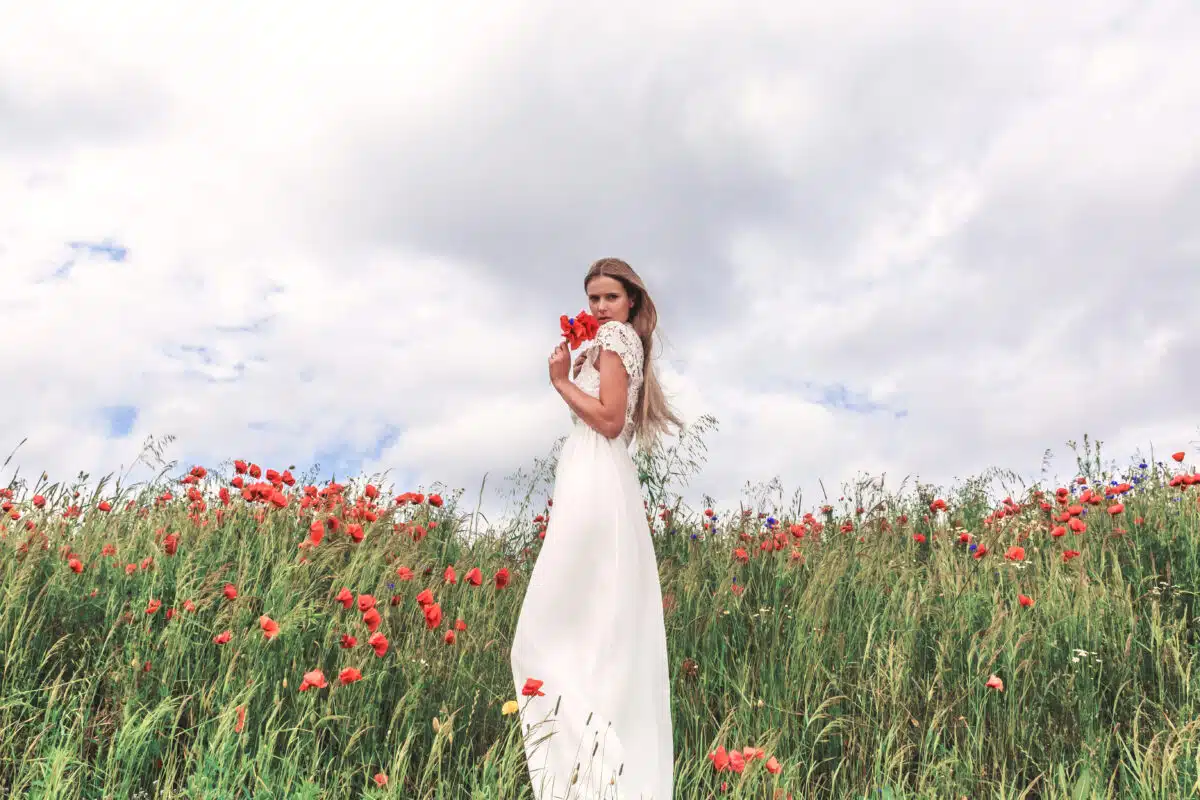
“The End of Summer” by Madison Julius Cawein
Pods are the poppies, and slim spires of pods
The hollyhocks; the balsam’s pearly bredes
Of rose -stained snow are little sacs of seeds
Collapsing at a touch; the lote, that sods
The pond with green, has changed its flowers to rods
And discs of vesicles; and all the weeds,
Around the sleepy water and its reeds,
Are one white smoke of seeded silk that nods.
Summer is dead, ay me! sweet Summer’s dead!
The sunset clouds have built her funeral pyre,
Through which, e’en now, runs subterranean fire:
While from the East, as from a garden bed,
Mist-vined, the Dusk lifts her broad moon – like some
Great golden melon—saying, “Fall has come.”
“To ——” by Alfred, Lord Tennyson
I send you here a sort of allegory,
( For you will understand it, ) of a soul,
À sinful soul possessed of many gifts,
A spacious garden full of flowering weeds,
A glorious Devil, large in heart and brain ,
That did love Beauty only, ( Beauty seen
In all varieties of mould and mind,
And Knowledge for its beauty; or if Good,
Good only for its beauty , seeingnot
That Beauty, Good, and Knowledge, are three sisters
That dote upon each other, friends to man,
Living together under the same roof,
And never can be sundered without tears.
And he that shuts Love out, in turn shall be
Shut out from Love, and on her threshold lie
Howling in outer darkness. Not for this
Was commonclay ta’en from the common earth ,
Moulded by God, and tempered with the tears
Of angels to the perfect shape of man.
“In The WildWood” by Madison Julius Cawein
I lie where silence sleeps,
And twilight dreams and sighs;
Where all heaven’s azure peeps
Blue from one wildflower’s eyes;
Where, in reflecting deeps,
A world, inverted, lies,
Of dimmer woods and skies:
Divining God from things
Humble as weed and bee;
From songs the wild bird sings
Guessing at poetry;
And from each flower that swings,
Each star-familiar tree,
Learning philosophy.
“Hoar-Frost” by Madison Julius Cawein
The frail eidolons of all blossoms Spring,
Year after year, about the forest tossed,
The magic touch of the enchanter, Frost,
Back from the Heaven of the Flow’rs doth bring;
Each branch and bush in silence visiting
With phantom beauty of its blooms long lost:
Each dead weed bends, white-haunted of its ghost,
Each dead flower stands ghostly with blossoming.
This is the wonder-legend Nature tells
To the gray moon and mist a winter’s night;
The fairy-tale which from her fancy wells
With all the glamour of her soul’s delight:
Before the summoning sorcery of her eyes
Rising, as might a dream materialize.
“Sonnet” by Frances Anne Butler
Thou poisonous laurel leaf, that in the soil
Of life, which I am doomed to till full sore,
Spring’st like a noisome weed! I do not toil
For thee, and yet thou still com’st dark’ning o’er
My plot of earth with thy unwelcome shade.
Thou nightshade of the soul, beneath whose boughs
All fair and gentle buds hang withering!
Why hast thou wreathed thyself around my brows,
Casting from thence the blossoms of my spring,
Breathing on youth’s sweet roses till they fade?
Alas! thou art an evil weed of woe,
Watered with tears and watched with sleepless care,
Seldom doth envy thy green glories spare;
And yet men covet thee—ah, wherefore do they so!
“Make Room” by Ethelwyn Wetherald
Room for the children out of doors,
For heads of gold or gloom;
For raspberry lips and rose-leaf cheeks and palms,
Make room—make room!
Room for the springtime out of doors,
For buds in green or bloom;
For every brown bare-handed country weed
Make room—make room!
Room for earth’s sweetest out of doors,
And for its worst a tomb;
For housed-up griefs and fears, and scorns, and sighs,
No room—no room!
“By Fields of Grass” by Ethelwyn Wetherald
By fields of grass and woodland silences
The city’s tumult is encamped around;
The jingling, clanging, shrieking fiends of sound
Expire within the wide world-circling breeze.
The soul amid a multitude of trees,
Or grass enveloped on the fragrant ground,
Is lifted to its utmost starry round,
And listens to celestial harmonies.
From this unspeakably divine rebirth,
Its sordid life returning shows through rifts
How purely spreads the sky, how musical
The streams and breezes flow across the earth,
How light the tree its fruity load uplifts,
How easily the weed is beautiful.
“Attadale West Highlands” by William Ernest Henley
To A. J.
A black and glassy float, opaque and still,
The loch, at furthest ebb supine in sleep,
Reversing, mirrored in its luminous deep
The calm grey skies; the solemn spurs of hill;
Heather, and corn, and wisps of loitering haze;
The wee white cots, black-hatted, plumed with smoke;
The braes beyond—and when the ripple awoke,
They wavered with the jarred and wavering glaze.
The air was hushed and dreamy. Evermore
A noise of running water whispered near.
A straggling crow called high and thin. A bird
Trilled from the birch-leaves. Round the shingled shore,
Yellow with weed, there wandered, vague and clear,
Strange vowels, mysterious gutturals, idly heard.
“The Children of the Poor” by Adolf Wolff
The children of the poor are little plants
That grow in sandy soil midst rocks and weeds
And rusty cans of tin, and other junk
Within the gloomy shadow of a wall,
The gloomy shadow of a mildewed wall;
Poor little plants! poor children of the poor.

“Success” by Madison Julius Cawein
How some succeed, who have least need,
In that they make no effort for!
And pluck, where others pluck a weed,
The burning blossom of a star,
Grown from no earthly seed.
For some shall reap who never sow;
And some shall toil and ne’er attain—
What boots it, in ourselves to know
Such labor here is not in vain,
When we still see it so!
Poems About Weeds in the Garden
“Weed Or Flower” by Helen Leah Reed
“‘Tis but a common thing,” one coldly said,
“Nay, call it not a flower – this little weed,
If plucking it, I kill it, root and seed –
Better the world were if it lay there dead.”
“Ah – rather let it live!” a second cried,
“Weed it may be, and yet it has its use,
Here in its healing essence its excuse
For blooming lies, and here its only pride.”
“Destroy it not!” another pled, “Behold
This tapering leaf – this soft and tender green,
Upon my canvas it shall bloom serene –
This tiny chalice-fleck of living gold.”
Then one bent over it, “Ah, flowret bright!
For only flowers in this garden grow, –
His earth, His sunshine made thee, o’er thee blow
His winds, frail thing! In thee He shows His might.”
“The Glory of the Garden” by Rudyard Kipling
Our England is a garden that is full of stately views,
Of borders, beds and shrubberies and lawns and avenues,
With statues on the terraces and peacocks strutting by;
But the Glory of the Garden lies in more than meets the eye.
For where the old thick laurels grow, along the thin red wall,
You’ll find the tool- and potting-sheds which are the heart of all,
The cold-frames and the hot-houses, the dungpits and the tanks,
The rollers, carts and drain-pipes, with the barrows and the planks.
And there you’ll see the gardeners, the men and ’prentice boys
Told off to do as they are bid and do it without noise;
For, except when seeds are planted and we shout to scare the birds,
The Glory of the Garden it abideth not in words.
And some can pot begonias and some can bud a rose,
And some are hardly fit to trust with anything that grows;
But they can roll and trim the lawns and sift the sand and loam,
For the Glory of the Garden occupieth all who come.
Our England is a garden, and such gardens are not made
By singing:—“Oh, how beautiful!” and sitting in the shade,
While better men than we go out and start their working lives
At grubbing weeds from gravel-paths with broken dinner-knives.
There’s not a pair of legs so thin, there’s not a head so thick,
There’s not a hand so weak and white, nor yet a heart so sick,
But it can find some needful job that’s crying to be done,
For the Glory of the Garden glorifieth every one.
Then seek your job with thankfulness and work till further orders,
If it’s only netting strawberries or killing slugs on borders;
And when your back stops aching and your hands begin to harden,
You will find yourself a partner in the Glory of the Garden.
Oh, Adam was a gardener, and God who made him sees
That half a proper gardener’s work is done upon his knees,
So when your work is finished, you can wash your hands and pray
For the Glory of the Garden that it may not pass away!
And the Glory of the Garden it shall never pass away!
“The Dead Garden” by Paul England
‘Bring me flowers from your garden!’
‘What flowers should I bring?
The blight lies black
In passion’s track
Over each dead thing.’
‘Let me drink at the fountain!’
‘There only the weeds wave high;
In happier years
“Twas fed with tears,
Now long run dry.’
‘May I walk with you in the path-ways?’
‘Is ever a soul so brave?
In each garden bed
Are the restless dead,
And there’s one new grave.’
‘Must I go my way without you?’
‘We part, love, at the gates;
For the brain is old,
And the body cold,
And the new grave waits.’
“Weeds” by Edna St. Vincent Millay
White with daisies and red with sorrel
And empty, empty under the sky!–
Life is a quest and love a quarrel–
Here is a place for me to lie.
Daisies spring from damned seeds,
And this red fire that here I see
Is a worthless crop of crimson weeds,
Cursed by farmers thriftily.
But here, unhated for an hour,
The sorrel runs in ragged flame,
The daisy stands, a bastard flower,
Like flowers that bear an honest name.
And here a while, where no wind brings
The baying of a pack athirst,
May sleep the sleep of blessed things,
The blood too bright, the brow accurst.
“A Widow’s Weeds” by Walter De La Mare
A poor old Widow in her weeds
Sowed her garden with wild-flower seeds;
Not too shallow, and not too deep,
And down came April – drip – drip – drip.
Up shone May, like gold, and soon
Green as an arbour grew leafy June.
And now all summer she sits and sews
Where willow herb, comfrey, bugloss blows,
Teasle and pansy, meadowsweet,
Campion, toadflax, and rough hawksbit;
Brown bee orchis, and Peals of Bells;
Clover, burnet, and thyme she smells;
Drowsy from dawn to dusk with bees.
Weeps she never, but sometimes sighs,
And peeps at her garden with bright brown eyes;
A poor Old Widow in her weeds.
“A Flower of the Fields” by Madison Julius Cawein
Bee-bitten in the orchard hung
The peach; or, fallen in the weeds,
Lay rotting, where still sucked and sung
The gray bee, boring to the seed’s
Pink pulp and honey blackly stung.
The orchard-path, which wound around
The garden,—with its heat one twinge
Of dinning locusts,—picket-bound
And ragged, brought me where one hinge
Held up the gate that scraped the ground.
All seemed the same: the martin-box—
Sun-warped, with pygmy balconies—
Still stood, with all its twittering flocks,
Perched on its pole above the peas
And silvery-seeded onion-stocks.
The clove-pink and the rose; the clump
Of coppery sunflowers, with the heat
Sick to the heart: the garden stump,
Red with geranium-pots, and sweet
With moss and ferns, this side the pump.
I rested with one hesitant hand
Upon the gate. The lonesome day,
Droning with insects, made the land
One dry stagnation. Soaked with hay
And scents of weeds the hot wind fanned.
I breathed the sultry scents, my eyes
Parched as my lips. And yet I felt
My limbs were ice.—As one who flies
To some wild woe.—How sleepy smelt
The hay-hot heat that soaked the skies!
Noon nodded; dreamier, lonesomer
For one long, plaintive, forest-side
Bird-quaver.—And I knew me near
Some heartbreak anguish…. She had died.
I felt it, and no need to hear.
I passed the quince-and pear-tree; where,
All up the porch, a grape-vine trails.—
How strange that fruit, whatever air
Or earth it grows in, never fails
To find its native flavor there!
And she was as a flower, too,
That grows its proper bloom and scent
No matter what the soil: she, who,
Born better than her place, still lent
Grace to the lowliness she knew….
They met me at the porch and were
Gaunt-eyed with weeping.—Then the room
Shut out the country’s heat and purr,
And left light stricken into gloom—
So love and I might look on her.
Famous Poems About Weeds

From “The Chapel of the Hermits” by John Greenleaf Whittier
“With dry dead moss and marish weeds
His fire the western herdsman feeds,
And greener from the ashen plain
The sweet spring grasses rise again.
“Nor thunder-peal nor mighty wind
Disturb the solid sky behind;
And through the cloud the red bolt rends
The calm, still smile of Heaven descends!
“Thus through the world , like bolt and blast,
And scourging fire , thy words have passed.
Clouds break,— the steadfast heavens remain;
Weeds burn,— the ashes feed the grain!
“But whoso strives with wrong may find
Its touch pollute , its darkness blind;
And learn, as latent fraud is shown
In others’ faith, to doubt his own.
“The Willow Bottom” by Madison Julius Cawein
Lush green the grass that grows between
The willows of the bottom-land;
Edged by the careless water, tall and green
The brown-topped cat-tails stand.
The cows come gently here to browse,
Slow through the great-leafed sycamores:
You hear a dog bark from a low-roofed house
With cedars round its doors.
Then all is quiet as the wings
Of the one buzzard floating there:
Anon a woman’s high-pitched voice that sings
An old camp-meeting air.
A cock that flaps and crows; and then—
Heard drowsy through the rustling corn—
A flutter, and the cackling of a hen
Within a hay-sweet barn.
How still again! no water stirs:
No wind is heard: although the weeds
Are waved a little: and from silk-filled burrs
Drift by a few soft seeds.
So drugged with dreams the place, that you
Expect to see her gliding by,—
Hummed round of bees, through blossoms spilling dew,—
The Spirit of July.
“The Ivy Green” by Charles Dickens
O, a dainty plant is the ivy green,
That creepeth o’er ruins old!
Of right choice food are his meals, I ween,
In his cell so lone and cold.
The walls must be crumbled, the stones decayed,
To pleasure his dainty whim;
And the mouldering dust that years have made
Is a merry meal for him.
Creeping where no life is seen,
A rare old plant is the Ivy green.
Fast he stealeth on, though he wears no wings,
And a staunch old heart has he!
How closely he twineth, how tight he clings
To his friend, the huge oak-tree!
And slyly he traileth along the ground,
And his leaves he gently waves,
And he joyously twines and hugs around
The rich mould of dead men’s graves.
Creeping where grim death has been,
A rare old plant is the Ivy green.
Whole ages have fled, and their works decayed,
And nations have scattered been;
But the stout old ivy shall never fade
From its hale and hearty green.
The brave old plant in its lonely days
Shall fatten upon the past;
For the stateliest building man can raise
Is the ivy ’s food at last.
Creeping on where Time has been,
A rare old plant is the Ivy green.
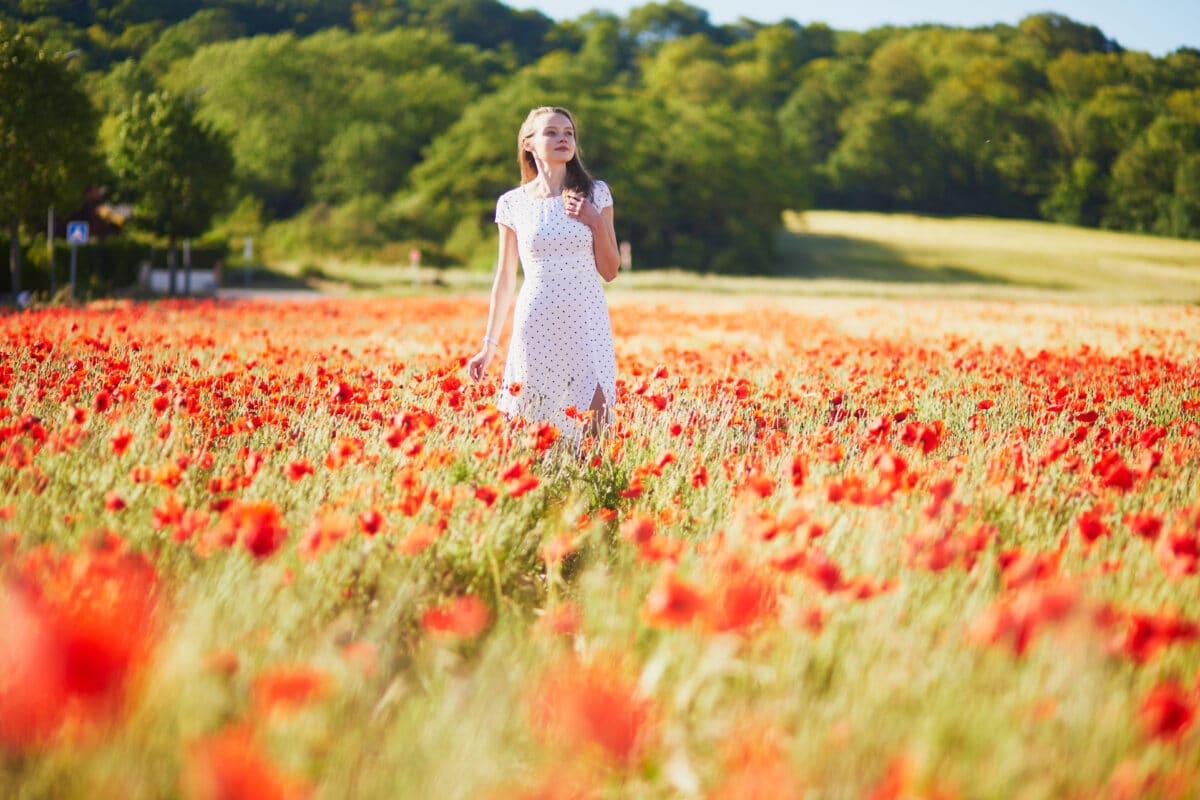
“The Scarlet Poppies” by L. A. Twamley
“We little red caps are among the corn,
Merrily dancing at early morn;
We know that the farmer hates to see
Our saucy red faces ; but here are we!
“We pay no price for our summer coats,
Like those slavish creatures, barley and oats;
We don’t choose to be ground and eat,
Like our heavy-headed neighbour, Gaffer Wheat.
“Who dare thresh us, we should like to know,
Grind us and bag us and use us so!
Let meaner and shabbier things than we
So stupidly bend to utility!”
So said little red cap, and all the rout
Of the Poppy – clan set up a mighty shout;
Mighty for them ; but if you had heard,
You had thought it the cry of a tiny bird.
So the Poppy- folk flaunted it over the field,
In pride of grandeur they nodded and reeled,
And shook out their jackets till nought was seen
But a wide, wide shimmer of scarlet and green.
They swelled and bustled with such an air,
The corn – fields quite in commotion were;
And the farmer cried, glancing over the grain,
“How the rascally weeds have come up again!”
“Ha! ha!” laughed the red caps, “ha! ha! what a fuss
Must the poor weeds be in ! how they’re envying us!”
But their mirth was cut short by the sturdy strokes
They speedily met from the harvest folks.
From “The Homestead” by John Greenleaf Whittier
Against the wooded hills it stands,
Ghost of a dead home, staring through
Its broken lights on wasted lands
Where old-time harvests grew.
Unploughed, unsown, by scythe unshorn,
The poor , forsaken farm-fields lie,
Once rich and rife with golden corn
And pale green breadths of rye.
Of healthful herb and flower bereft,
The garden plot no housewife keeps;
Through weeds and tangle only left,
The snake, its tenant, creeps.
A lilac spray , still blossom-clad,
Sways slow before the empty rooms;
Beside the roofless porch a sad
Pathetic red rose blooms.
His track , in mould and dust of drouth,
On floor and hearth the squirrel leaves,
And in the fireless chimney’s mouth
His web the spider weaves.
The leaning barn, about to fall,
Resounds no more on husking eves;
No cattle low in yard or stall,
No thresher beats his sheaves.
So sad, so drear! It seems almost
Some haunting Presence makes its sign;
That down yon shadowy lane some ghost
Might drive his spectral kine!
O home so desolate and lorn!
Did all thy memories die with thee?
Were any wed, were any born,
Beneath this low roof-tree?
Whose axe the wall of forest broke,
And let the waiting sunshine through?
What goodwife sent the earliest smoke
Up the great chimney flue?
Did rustic lovers hither come?
Did maidens, swaying back and forth
In rhythmic grace, at wheel and loom,
Make light their toil with mirth?
Did child feet patter on the stair?
Did boyhood frolic in the snow?
Did gray age , in her elbow chair,
Knit , rocking to and fro?
The murmuring brook, the sighing breeze,
The pine’s slow whisper, cannot tell;
Low mounds beneath the hemlock-trees
Keep the home secrets well.
Cease, mother-land, to fondly boast
Of sons far off who strive and thrive,
Forgetful that each swarming host
Must leave an emptier hive!
“Garden And Gardener” by Madison Julius Cawein
To weed the Garden of the Mind
Of all rank growths of doubt and sin,
And let faith’s flowers thrive and win
To blossom; and, through faith, to find
That lilies, too, can toil and spin,
And roses work for good and right;
That even the frailest flower that fills
A serious purpose, as God wills,
Is all man needs to give him light,
Is all he needs for all his ills.
Here is a Garden gone to flowers
While one beside it runs to weeds
Yet both were sown with similar seeds:
What was it? Did the World, or Hours,
Bring forth according to their needs?
Or was it that the Gardener
Neglected one? or did not care
What growths matured to slay and snare?
Thinking, whatever might occur,
Labour, perhaps, would manage there.
But Labour looked and took his ease,
Saying, “To-morrow I will do;
Will weed my Garden.” And in view
Of all that work sat down at peace,
Waiting for something to ensue.
Whose fault? The Gardener’s? Haply no
He sowed with fairest flowers the soil.
And yet, whence came the weeds that spoil
From Heaven! brought by winds that blow.
God give us all the gift to toil!
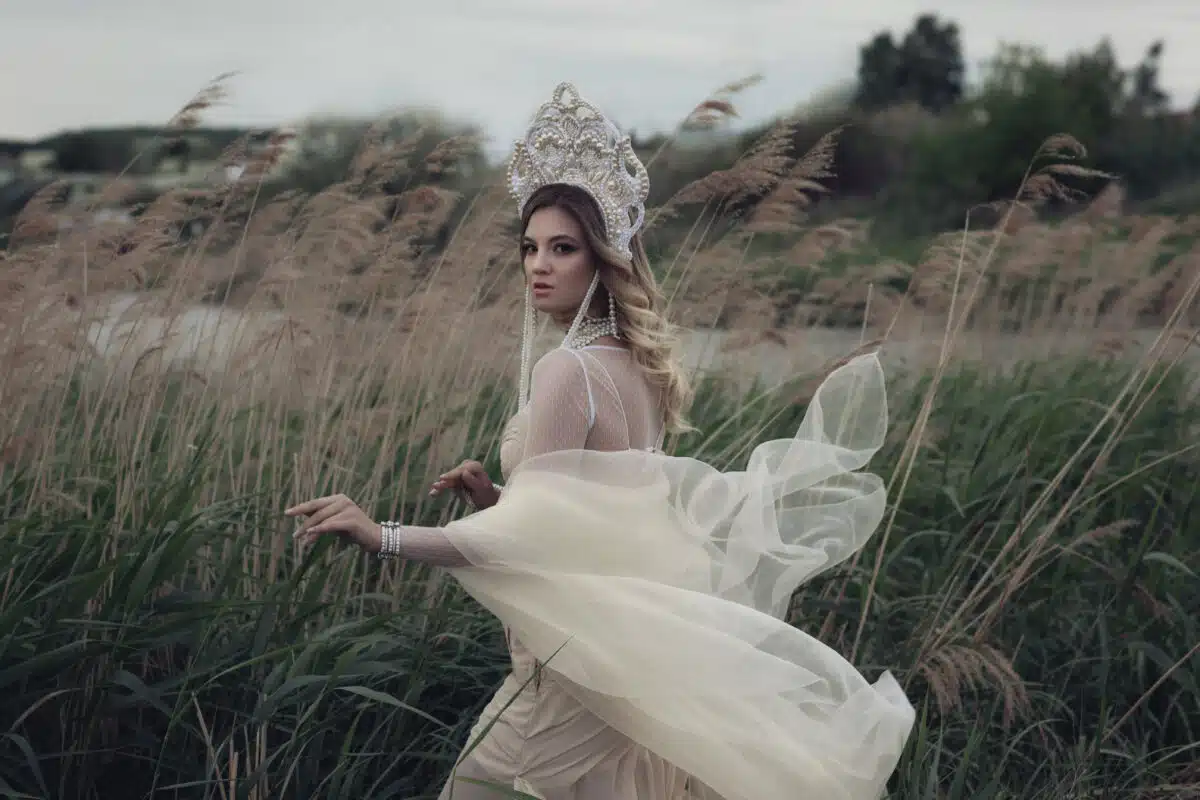
From “Ravenna” by Oscar Wilde
II
How strangely stilll no sound of life or joy
Startles the air; no laughing shepherd-boy
Pipes on his reed, nor ever through the day
Comes the glad sound of children at their play:
O sad , and sweet , and silent ! surely here
A man might dwell apart from troublous fear,
Watching the tide of seasons as they flow
From amorous Spring to Winter’s rain and snow,
And have no thought of sorrow ; – here, indeed,
Are Lethe’s waters , and that fatal weed
Which makes a man forget his fatherland.
Ay! amid lotus-meadows dost thou stand,
Like Proserpine, with poppy-laden head,
Guarding the holy ashes of the dead.
For though thy brood of warrior sons hath ceased ,
Thy noble dead are with thee! – they at least
Are faithful to thine honour: -guard them well ,
O childless city! for a mighty spell ,
To wake men’s hearts to dreams of things sublime ,
Are the lone tombs where rest the Great of Time.
“The Woodspurge” by Dante Gabriel Rossetti
The wind flapped loose, the wind was still,
Shaken out dead from tree and hill:
I had walked on at the wind’s will,—
I sat now, for the wind was still.
Between my knees my forehead was,—
My lips, drawn in, said not Alas!
My hair was over in the grass,
My naked ears heard the day pass.
My eyes, wide open, had the run
Of some ten weeds to fix upon;
Among those few, out of the sun,
The woodspurge flowered, three cups in one.
From perfect grief there need not be
Wisdom or even memory:
One thing then learnt remains to me,—
The woodspurge has a cup of three.
“The Mountain Fern” by Arthur Gerald Geoghegan
Oh, the fern, the fern, the Irish hill fern,
That girds our blue lakes from Lough Ine to Lough Erne,
That waves on our crags like the plume of a king,
And bends like a nun over clear well and spring.
The fairies’ tall palm-tree, the heath-bird’s fresh nest,
And the couch the red-deer deems the sweetest and best;
With the free winds to fan it, and dew-drops to gem,
Oh, what can ye match with its beautiful stem?
From the shrine of St. Finbar, by lone Avonbwee,
To the halls of Dunluce, with its towers by the sea,
From the hill of Knockthu to the rath of Moyvore,
Like a chaplet that circles our green island o’er,
In the bawn of the chief, by the anchorite’s cell,
On the hill-top or greenwood, by streamlet or well,
With a spell on each leaf which no mortal can learn,
Oh, there never was plant like the Irish hill fern!
Oh, the fern, the fern, the Irish hill fern,
That shelters the weary, or wild roe, or kern;
Through the glens of Kilcoe rose a shout on the gale,
As the Saxons rushed forth in their wrath from the Pale,
With bandog and blood-hound, all savage to see,
To hunt through Cluncalla the wild rapparee.
Hark! a cry from yon dell on the startled ear rings,
And forth from the wood the young fugitive springs,
Through the copse, o’er the bog, and oh, saints be his guide!
His fleet step now falters, there ’s blood on his side;
Yet onward he strains, climbs the cliff, fords the stream,
And sinks on the hill-top, ’mid bracken leaves green;
And thick o’er his brow are the fresh clusters piled,
And they cover his form as a mother her child,
And the Saxon is baffled. They never discern
Where it shelters and saves him, the Irish hill fern.
Oh, the fern, the fern, the Irish hill fern,
That pours a wild keen o’er the hero’s gray cairn,
Go hear it at midnight, when stars are all out,
And the wind o’er the hill-side is moaning about,
With a rustle and stir, and a low wailing tone
That thrills through the heart with its whispering lone;
And ponder its meaning, when haply you stray
Where the halls of the stranger in ruin decay;
With night-owls for warders, the goshawk for guest,
And their dais of honor by cattle-hoof pressed,
With its foss choked with rushes, and spider webs flung,
Over walls where the marchmen their red weapons hung,
With a curse on their name, and a sigh for the hour
That tarries so long. Look what waves on the tower
With an omen and sign, and an augury stern,
’T is the green flag of Time, ’t is the Irish hill fern.
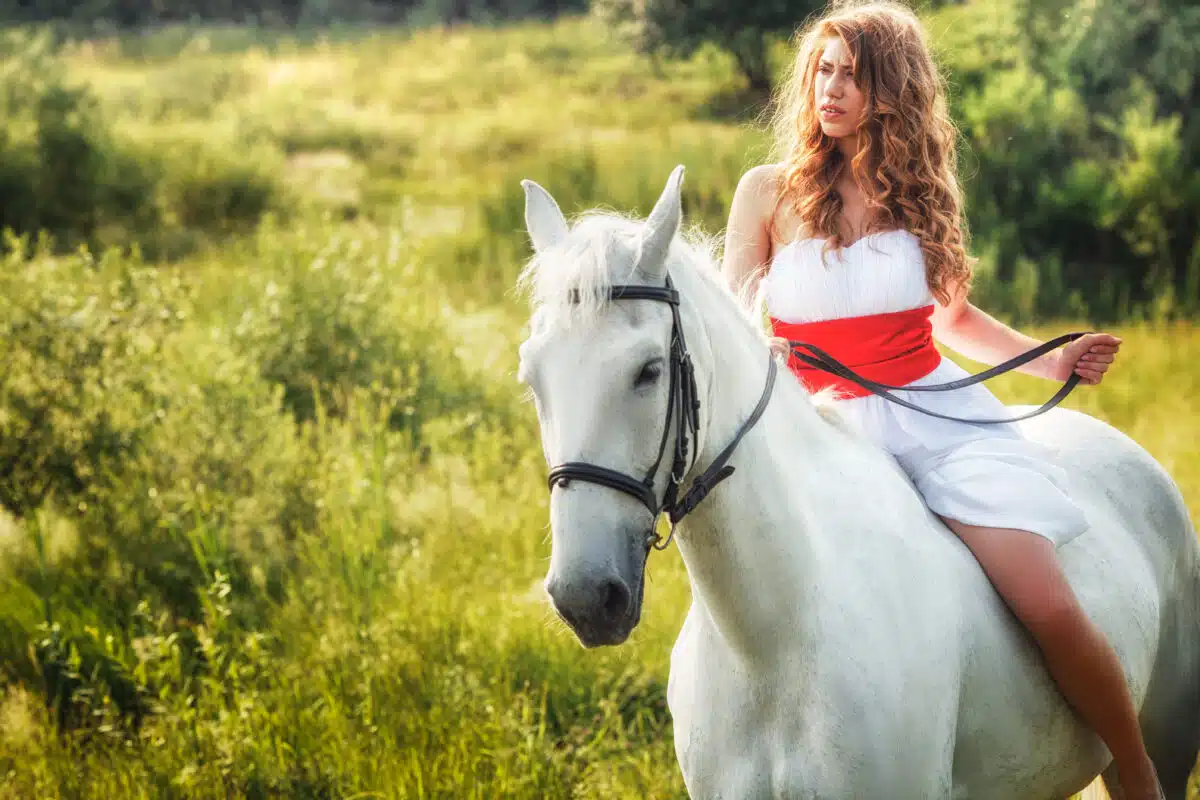
“Inversnaid” by Gerard Manley Hopkins
This darksome burn, horseback brown,
His rollrock highroad roaring down,
In coop and in comb the fleece of his foam
Flutes and low to the lake falls home.
A windpuff-bonnet of fáwn-fróth
Turns and twindles over the broth
Of a pool so pitchblack, féll-frówning,
It rounds and rounds Despair to drowning.
Degged with dew, dappled with dew
Are the groins of the braes that the brook treads through,
Wiry heathpacks, flitches of fern,
And the beadbonny ash that sits over the burn.
What would the world be, once bereft
Of wet and of wildness? Let them be left,
O let them be left, wildness and wet;
Long live the weeds and the wilderness yet.
From “To the Leaf Cricket” by Madison Julius Cawein
III
As dew-drops beady ,
As mist minute, thy notes ring low and reedy:
The vaguest vapor
Of melody, now near; now , like some taper
Of sound, far fading—
Thou will-o’- wisp of music aye evading .
Among the bowers,
The fog-washed stalks of Autumn’s weeds and flowers,
By hill and hollow,
I hear thy murmur and in vain I follow
Thou jack-o’-lantern voice, thou elfin cry,
Thou dirge, that tellest Beauty she must die
IV
And when the frantic
Wild winds of Autumn with the dead leaves antic;
And walnuts scatter
The mire of lanes; and dropping acorns patter
In grove and forest,
Like some frail grief, with the rude blast thou warrest,
Sending thy slender
Far cry against the gale, that, rough, untender,
Untouched of sorrow,
Sweeps thee aside, where, haply, I to-morrow
Shall find thee lying, tiny, cold and crushed,
Thy weak wings folded and thy music hushed.
“Heat” by Madison Julius Cawein
I
Now is it as if Spring had never been,
And Winter but a memory and dream,
Here where the Summer stands, her lap of green
Heaped high with bloom and beam ,
Among her blackberry -lilies, low that lean
To kiss her feet; or , freckle-browed, that stare
Upon the dragonfly which, slimly seen,
Like a blue jewel flickering in her hair,
Sparkles above them there.
II
Knee-deep among the tepid pools the cows
Chew a slow cud or switch a slower tail,
Half-sunk in sleep beneath the beechen boughs,
Where thin the wood-gnats ail.
From bloom to bloom the languid butterflies drowse;
The sleepy bees make hardly any sound;
The only things the sunrays can arouse,
It seems, are two black beetles rolling ’round
Upon the dusty ground.
III
Within its channel glares the creek and shrinks,
Beneath whose rocks the furtive crawfish hides
In stagnant places, where the green frog blinks,
And water-spider glides.
Far hotter seems it for the bird that drinks,
The startled kingfisher that screams and flies ;
Hotter and lonelier for the purple pinks
Of weeds that bloom , whose sultry perfumes rise
Stifling the swooning skies.
IV
From ragweed fallows, rye fields, heaped with sheaves,
From blistering rocks, no moss or lichens crust,
And from the road, where every hoof-stroke heaves
A cloud of burning dust,
The hotness quivers, making limp the leaves,
That loll like tongues of panting hounds. The heat
Is a wan wimple that the Summer weaves,
A veil, in which she wraps, as in a sheet,
The shriveling corn and wheat.
V
Furious, incessant in the eeds and briers
The sawing weed -bugs sing; and, heat-begot,
The grasshoppers, so many strident wires,
Staccato fiercely hot:
A lash of whirling sound that never tires,
The locust flails the noon , where harnessed Thirst,
Beside the road -spring, many a shod hoof mires,
Into the trough thrusts his hot head, immersed ,
‘ Round which cool bubbles burst.
VI
The sad, sweet voice of some wood-spirit who
Laments while watching a loved oak tree die,
From the deep forest comes the wood-dove’s coo,
A long, lost, lonely cry.
Oh, for a breeze, a mighty wind to woo
The woods to stormy laughter; sow like grain
The world with freshness of invisible dew,
And pile above far, fevered hill and plain,
Vast bastions black with rain.
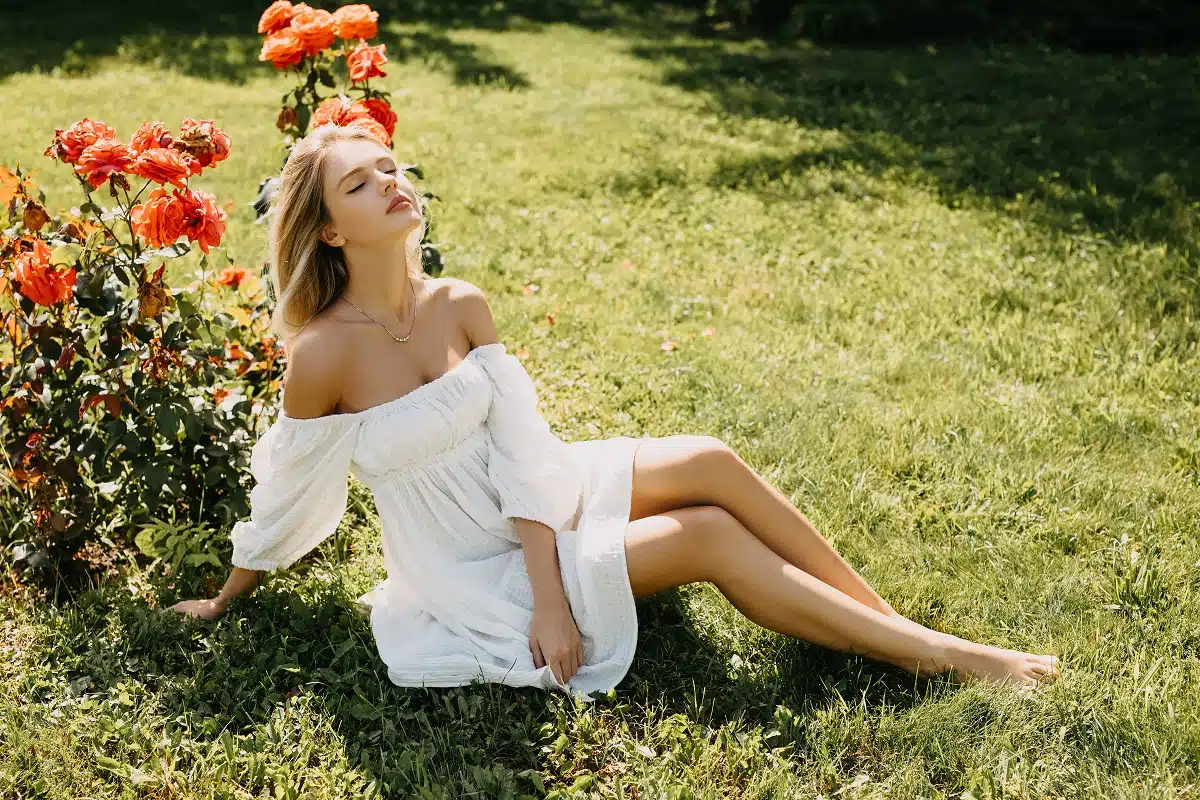
From “Sleep and Poetry” by John Keats
Yet I rejoice a myrtle fairer than
E’er grew in Paphos, from the bitter weeds
Lifts its sweet head into the air, and feeds
Asilent space with ever sprouting green.
All tenderest birds there find a pleasant screen,
Creep through the shade with jaunty fluttering,
Nibble the little cupped flowers and sing.
Then let us clear away the choaking thorns
From round its gentle stem; let the young fawns,
Yeaned in after times, when we are flown,
Find a fresh sward beneath it, overgrown
With simple flowers ; let there nothing be
More boisterous than a lover’s bended knee;
Nought more ungentle than the placid look
Of one who leans upon a closed book;
Nought more untranquil than the grassy slopes
Between two hills. All hail delightful hopes!
As she was wont, th’ imagination
Into most lovely labyrinths will be gone,
And they shall be accounted poet kings
Who simply tell the most heart-easing things.
O may these joys be ripe before I die.
From “Endymion” by John Keats
He saw far in the concave green of the sea
An old man sitting calm and peacefully.
Upon a weeded rock this old man sat,
And his white hair was awful, and a mat
Of weeds were cold beneath his cold thin feet;
And, ample as the largest winding-sheet,
A cloak of blue wrapp’d up his aged bones,
O’erwrought with symbols by the deepest groans
Of ambitious magic: every ocean-form
Was woven in with black distinctness; storm ,
And calm, and whispering, and hideous roar,
Quicksand, and whirlpool, and deserted shore,
Were emblem’d in the woof; with every shape
That skims, or dives, or sleeps, ‘ twixt cape and cape.
“The Dying Swan” by Alfred, Lord Tennyson
The plain was grassy , wild and bare,
Wide, wild, and open to the air,
Which had built up everywhere
An under – roof of doleful gray .
With an inner voice the river ran ,
Adown it floated a dying swan ,
And loudly did lament.
It was the middle of the day.
Ever the weary wind went on ,
And took the reed-tops as it went.
Some blue peaks in the distance rose,
And white against the cold -white sky
Shone out their crowning snows.
One willow over the river wept,
And shook the wave as the wind did sigh ;
Above in the wind was the swallow ,
Chasing itself as its own wild will,
And far through the marish green and still
The tangled watercourses slept,
Shot over with purple, and green, and yellow.
The wild swan’s death -hymn took the soul
Of that waste place with joy
Hidden in sorrow: at first to the ear
The warble was low, and full and clear;
And floating about the under-sky,
Prevailing in weakness, the coronach stole
Sometimes afar, and sometimes anear;
But anon her awful jubilant voice,
With a music strange and manifold,
Flowed forth on a carol free and bold:
As when a mighty people rejoice
With shawms, and with cymbals, and harps of gold
And the tumult of their acclaim is rolled
Through the open gates of the city afar,
To the shepherd who watcheth the evening star.
And the creeping mosses and clambering weeds,
And the willow-branches hoar and dank,
And the wavy swell of the soughing reels,
And the wave-worn horns of the echoing bank,
And the silvery marish-flowers that throng
The desolate creeks and pools among,
Were flooded over with eddying song.
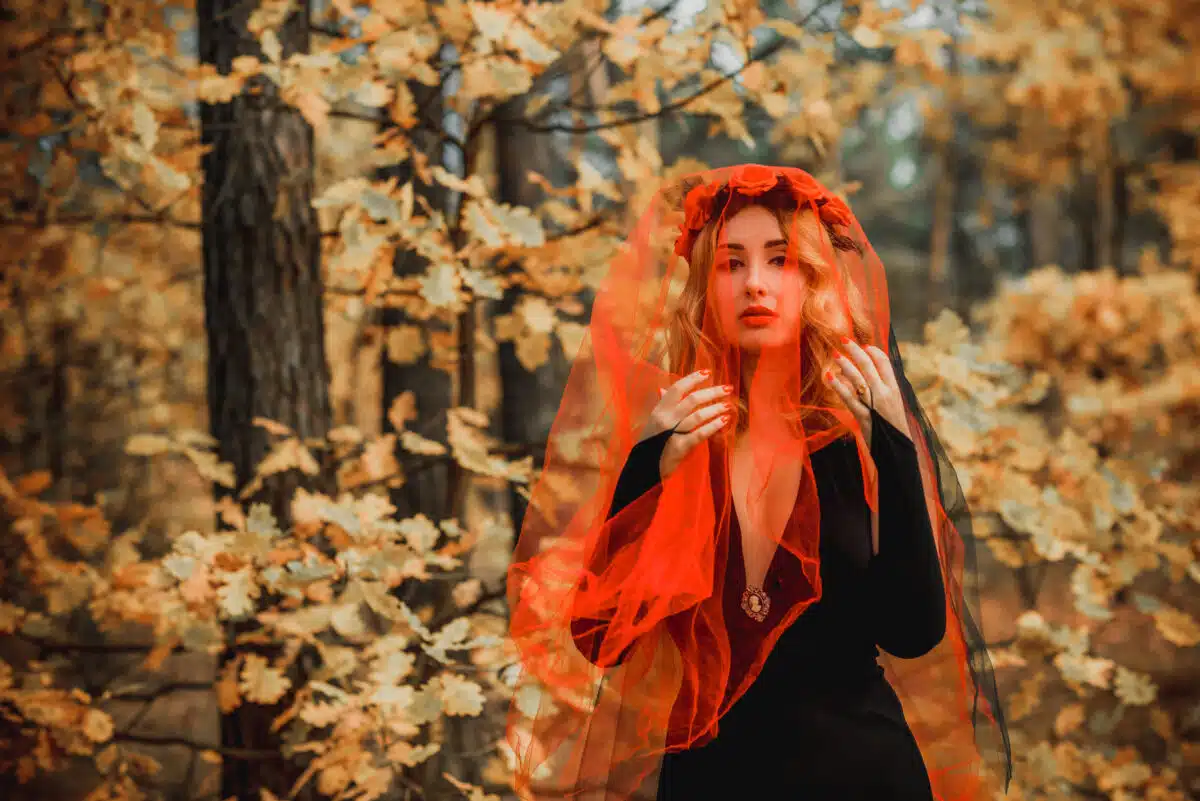
“The Forgotten Grave” by Emily Dickinson
After a hundred years
Nobody knows the place, —
Agony, that enacted there,
Motionless as peace.
Weeds triumphant ranged,
Strangers strolled and spelled
At the lone orthography
Of the elder dead.
Winds of summer fields
Recollect the way, —
Instinct picking up the key
Dropped by memory.
“May” by Madison Julius Cawein
The golden discs of the rattlesnake-weed,
That spangle the woods and dance—
No gleam of gold that the twilights hold
Is strong as their necromance:
For, under the oaks where the woodpaths lead,
The golden discs of the rattlesnake-weed
Are the May’s own utterance.
The azure stars of the bluet bloom,
That sprinkle the woodland’s trance—
No blink of blue that a cloud lets through
Is sweet as their countenance:
For, over the knolls that the woods perfume,
The azure stars of the bluet bloom
Are the light of the May’s own glance.
With her wondering words and her looks she comes,
In a sunbeam of a gown;
She needs but think and the blossoms wink,
But look, and they shower down.
By orchard ways, where the wild bee hums,
With her wondering words and her looks she comes
Like a little maid to town.
From “Intimations Of The Beautiful” by Madison Julius Cawein
XVIII
The flowers of the fall I seek:
The purple aster,—like a gauze
Of pearl,—beneath the nodding haws
Or making gay each tangled creek:
The hairy, small herb-Robert, lost,—
Yet seen,—among the weeds which crush
Or crowd it, with its bluish blush;
Its rough, low stalk stung red with frost.
Around the rail-fence, climbing up,
The nightshade hangs rich berries down,—
Clusters of cochineal,—that drown
The flowering bind-weed’s pendant cup:
And where the boggy bottom sets
Its burs as breastworks and as tents,
Like bivouacking regiments,
The cat-tails stack their bayonets.
From amaranth—in tree and flower—
To asphodel-in weed and bloom—
The season swings a magic loom
Of sun and mist from hour to hour:
In its wide warp it weaves the dyes
Of morning’s brilliant blue and gray;
And crimson through the weft of day
Flings the wild woof of evening skies.
Inspirational Poems About Weeds

“The Useful Weed” by James McIntyre
Do not despise the humble weed,
For the Lord He first sowed the seed,
Perhaps it bears most precious fruit,
And useful leaves and potent root.
Though it seems now a useless weed,
Countless millions it yet may feed,
Or future ages it may prize,
Finding in it beauteous dyes.
Or a valued healing balm,
Will make the heated pulse beat calm,
And the future men of science,
May place on it strong reliance.
And it may play important part,
In advancing skill and art,
And no person now doth know
How useful are the weeds that grow.
Weeds we now look on with leathing,
They may yet be used for clothing,
Producing silken glossy coat,
Or paper fine for the bank note.
But you at present must take heed,
And do not grow the cumbrous weed,
Either in garden or in field,
Where plants with profit now do yield.
“Love You Well the Little Ones” by Brian O’Higgins
Oh, love you well the little ones,
And shield them from the strife,
Too soon they’ll know the sorrows,
And the weary ways of life.
Too soon they’ll know the achings,
And the crosses, and the woe:
When they’re toiling up the mountain
From the pleasant plains below.
Oh, love you well the little ones,
And win each guileless heart,
Too soon, indeed, will come the day
When you and they must part.
A cheery smile, a gentle word,
A kindly, generous deed
Will touch their souls, and blossom there:
The fruits will tell the seed.
Oh, love you well the little ones,
And serve them when you may,
Bright flowerets are they – blooming
By a rough and barren way.
And yours the hand to raise them up,
Or plant the weeds of doom:
Your lips can speak their future fate:
“To wither,” or “to bloom.”
Oh, love you well the little ones,
When pain comes swooping down,
Be yours the task to meet it there,
And chase away its frown.
Remember, you were once a child!
Remember, Christ has said:
“Oh, love you well the little ones,
Of such is Heaven made.”
“Prairie Spring” by Willa Cather
Evening and the flat land,
Rich and somber and always silent;
The miles of fresh-plowed soil,
Heavy and black, full of strength and harshness;
The growing wheat, the growing weeds,
The toiling horses, the tired men;
The long, empty roads,
Sullen fires of sunset, fading,
The eternal, unresponsive sky.
Against all this, Youth,
Flaming like the wild roses,
Singing like the larks over the plowed fields,
Flashing like a star out of the twilight;
Youth with its insupportable sweetness,
Its fierce necessity,
Its sharp desire;
Singing and singing,
Out of the lips of silence,
Out of the earthy dusk.
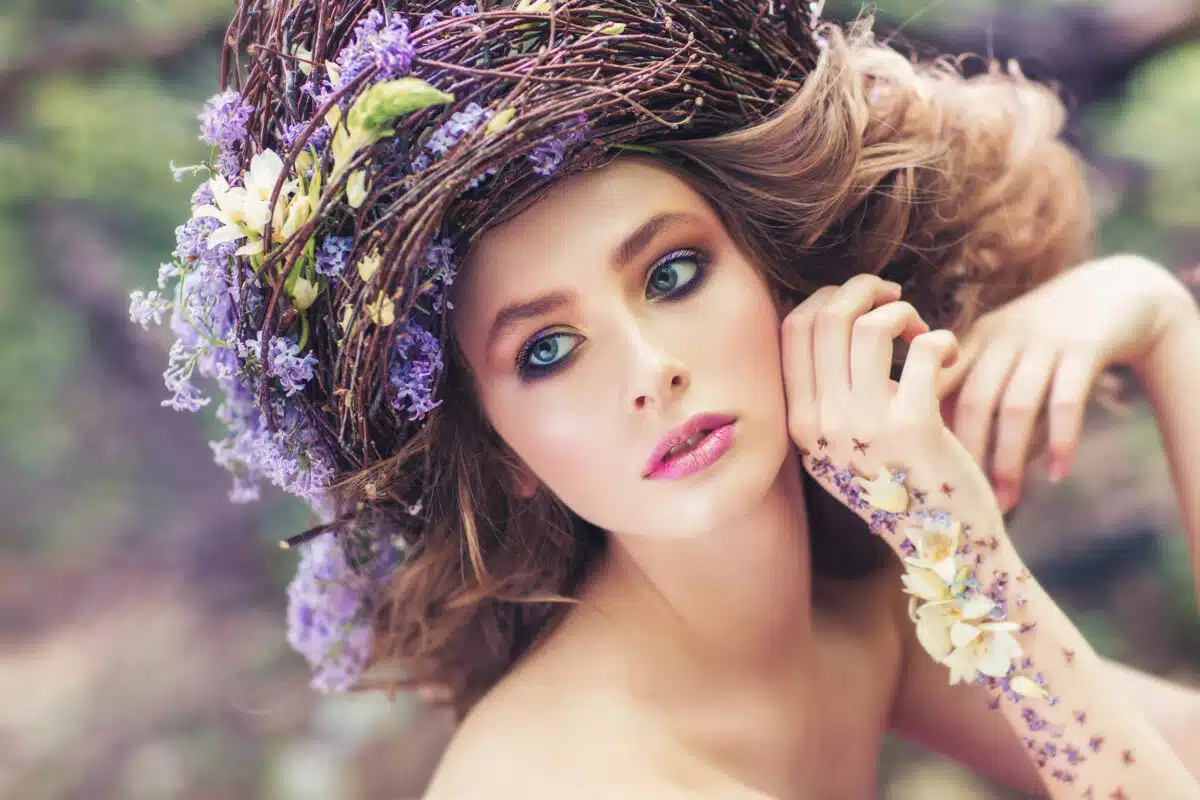
From “Onward Ever” by Lucy Batham
Onward ever! and while lending
Strength to weary, sight to blind,
Thou, thyself, with strength increasing ,
Shalt Life’s pathway clearer find :
And the wreaths for others twining
Peace shall cluster round thy brow ;
And the light for others shining
Joy’s bright smiles shall o’er thee throw
Till no cloud shall cast a shadow
In the land to which you go.
Onward ever! firmly treading,
Crush beneath thy feet the thorn ;
Weeds and briars of sin besetting,
Let them by the roots be torn :
Not depending on thy labours
To attain to bliss above,
Still, let Faith within thy spirit
Be a Faith that works by Love,
Winning gems of fadeless splendour
That shall grace thy crown above.
“The Bindweed” by John Harris
As earth grows older, more sounds fill the hollows
Than when our lives were young:
The crags have voices, whither float the swallows;
Each tree -top has a tongue.
The common flowers that gem the wayside hedges,
Or spring the brakes among,
Adorn the cliffs, and beautify the ledges,
Have all the sound of song.
The climbing BINDWEED, twining to the bramble,
Or to the woodbine lone,
Round whose pink bells the murmuring wild bees ramble,
Speaks not to earth alone.
Like jets of music o’er the shining waters,
Whose banks the lilies line,
Where sweetly blossom Nature’s choicest daughters,
Float forth thy lays Divine.
And as at morn and eve thou fondly clingest
With an untiring will,
Who listens longest hears thee, as thou singest,
“Upward and upward still.”
From “The Treasures of the Deep” by Lucy Batham
The treasures of the deep!
Oh, tell me, ye who Ocean’s pathway tread,
Ye, who your vigils keep
When moons and stars light up its watery bed:
Ye, who across the main
Day after day the trackless path fulfil,
While on that wondrous plain,
With what strange musings doth your spirit thrill ?
Oh, when the sun is bright,
And feathery clouds are sailing o’er the sky ;
And all around is light,
Reflected from the glorious arch on high:
When wavelets sink to rest
By gentle murmurs hushed in slumber deep ,
As on its mother’s breast
The weary infant sweetly falls to sleep :
And when the air is calm ,
As if unruffled by a thought of care,
Thou drinkest in the balm
Of holy stillness that is breathing there:
Say, dost thou sometimes raise
The lid of Fancy’s dreamy eyes, and see,
With wonder and amaze,
The hidden treasures thus revealed to thee? —
The treasures of the deep!
God’s priceless jewels ‘neath the waves that dwell,
Where, rocked in peaceful sleep,
No more shall wake to hear the billows swell?
Full many a lovely form ,
With sea-weeds wreathed, andpearls and corals deck’d,
Meek victims of the storm
When Ocean’s bride in stateliness was wreck’d.
And trusting childhood there,
No more on earth to meet affection’s ray,
Strewn o’er with grateful care
By shells, with which their lily-hands would play.
And tender youthful plants,
At rest beside the manly and the brave;
Lulled as the sea -bird chants
Her pensive melodies above their grave.
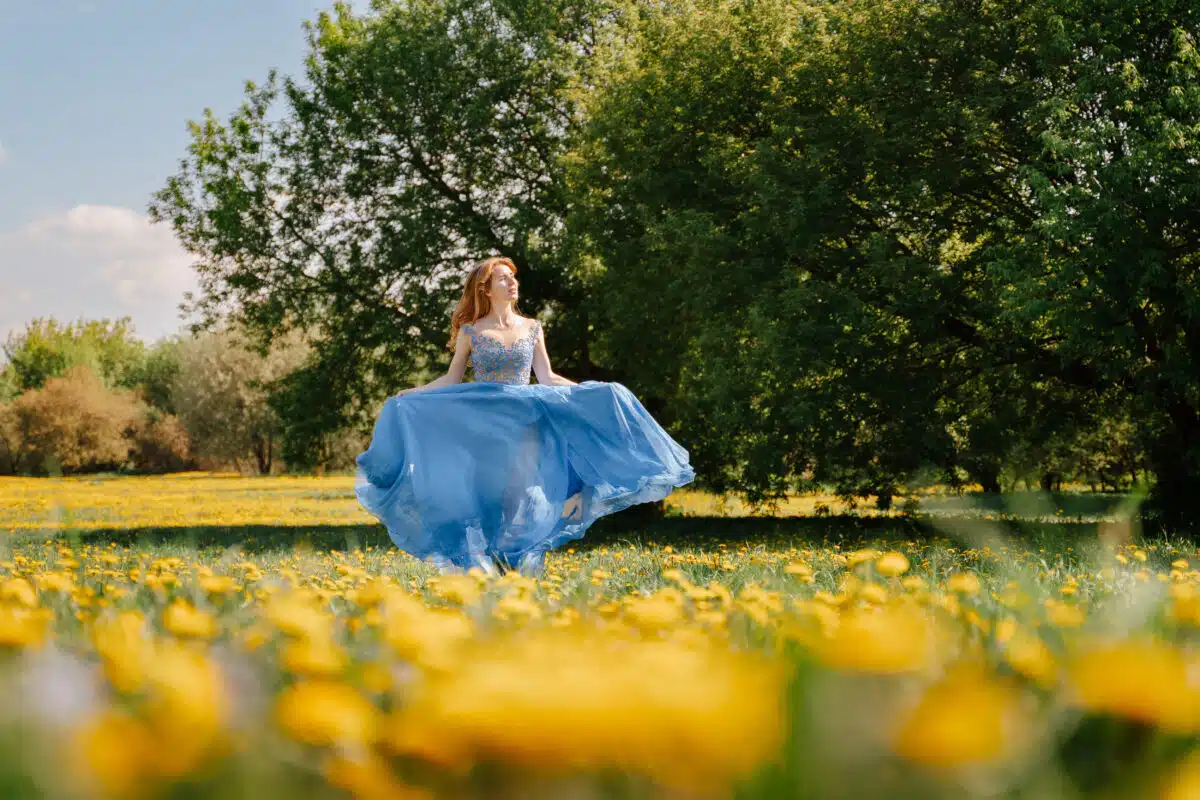
“The Silver Weed” by John Harris
Hail, my little SILVER WEED!
Growing on the upland mead,
Holding out thy yellow flowers
In the roadside’s broken bowers,
Blooming on the brooklet’s bank
Mid the mosses smooth and dank,
And along the lone highway
Where the swallows sport and play,
And the ivy climbs the tree:
I will sing for love of thee.
Country children know thee well :
For thy roots they search the dell,
Which they roast and eat with joy,
Many a girl and many a boy.
Matron meek and maiden young,
Age with wisdom on his tongue,
These who follow , those who lead,
Love the darling SILVER WEED.
Thus, when swallows skim the mere,
In the summer of the year,
And the sunshine hangs its beams
O’er the channels of the streams,
Let me tune my simple reed
To the shining SILVER WEED.
“The Grave of the Indian Chief” by Percival
They laid the corse of the wild and brave
On the sweet fresh earth of the new dug grave,
On the gentle hill, where the wild weeds wave,
And Howers and grass were flourishing.
They laid within the peaceful bed,
Close by the Indian chieftain’s head,
His bow and arrows; and they said
That he had found new hunting grounds.
Where bounteous nature only tills
The willing soil; and o’er whose hills,
And down beside the shady rills,
The hero roams eternally.
And these fair isles to the westward lie,
Beneath a golden sun-set sky,
Where youth and beauty never die,
And song and dance move endlessly.
They told of the feats of the dog and gun ,
They told of the deeds his arm had done,
They sung the battles lost and won,
And sothey paid his eulogy.
And o’er his arms, and o’er his bones,
Theyraised a simple pile of stones;
Which , hallowed by their tears and moans,
Was all the Indian’s monument.
And since the chieftain here has slept,
Full many a winter’s winds have swept,
And many an age has softly crept
Over his humble sepulchre.”
“The Wood Sorrel” by John Harris
I cannot see thee by the meadow wicket
With thy green leaves outspread,
Or smiling shyly in the solemn thicket
With elm trees overhead,
But what thou comest in my father’s holding
Beside a broken stile ,
In all thy mystic loveliness unfolding,
Where the fern – fairies smile .
How prized thy leaves when boyhood’s rainbow glitter
Hung o’er the fields of light,
Ere I had sipped the Marah waters bitter
Of murky care and blight!
Even then I watched thy triple leaflets closing
If but a cloud arose ,
And marked thee on thy evening couch reposing
Beneath the woodland rose.
And now I cannot see the small WOOD SORREL
Beside the fragrant thyme,
But what old days, half hid in fading laurel,
Come in my homely rhyme.
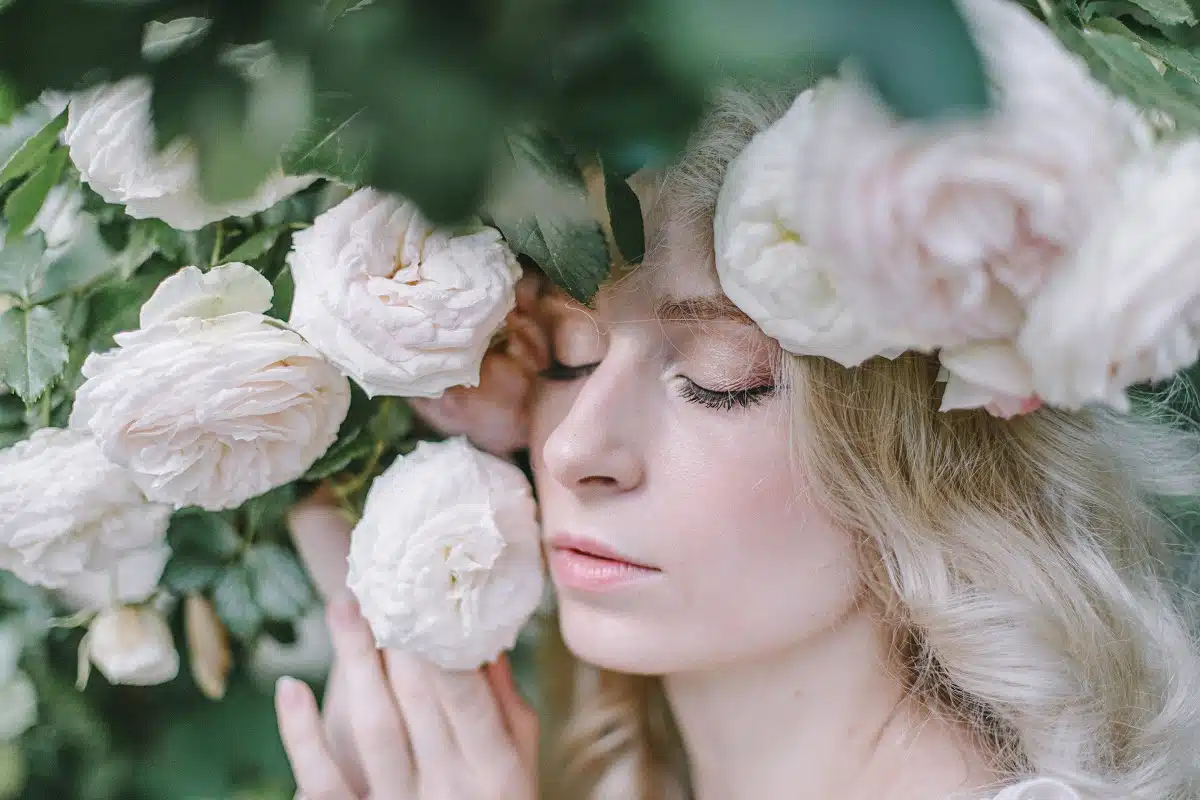
“The Moss Rose” from the German of Krummacher
The Angel of the flowers, one day,
Beneath a rose-tree sleeping lay;
That spirit to whose charge ’tis given
To bathe young buds in dews of heaven;
Awaking from his light repose,
The Angel whispered to the rose,
“O fondest object of my care,
Still fairest found, where all are fair,
For the sweet shade thou giv’st to me,
Ask what thou wilt, ’tis granted thee !”
“Then,” said the rose, with deepened glow,
“On me another grace bestow.”
The spirit paused in silent thought,
What grace was there that flower had not?
‘Twas but a moment– o’er the rose
A veil of moss the Angel throws;
And, robed in nature’s simplest weed,
Could there a flower that rose exceed?
“The Knot Grass” by John Harris
How often are our holiest intentions
Miscalled, misunderstood!
Unselfish deeds, “the hypocrite’s inventions;
And “evil,” what is good.
And it is hard to lay our simple treasure
Down at the world’s cold feet,
To lie unnoticed in its paths of pleasure,
Like daisies on the street.
The rude, the rough, command eternal wonder;
The noisy nothings please:
Ten thousand ears are open to the thunder,
Which scarcely hear the breeze.
Why come not forth where loving Nature teacheth
Sweet lessons night and day,
And every wild flower of the land beseecheth
Men in His name to pray?
So sighs the KNOT Grass in its emerald tangle
With unassuming mien ,
Where brighter flowers the summer pastures spangle,
Modest, and mild, and green.
“The Thrift” by John Harris
There are more children than the fireside cheereth,
Bright-eyed and beauty-born ,
Where’er the light in living lines careereth
Forth from the doors of Morn .
They line the leafy forest’s solemn dwelling,
Play by the rippling rill,
Lift up their faces where green corn is swelling,
Bloom by the echoing mill.
We know them by their purity of features,
Where’er they smiling stand :
God’s gentle, star-eyed, innocent, sweet creatures,
The wild flowers of the land.
Nor is the THRIFT less lovely by the shingle,
Or near the sea-bird’s nest,
Than blushing þuds where reeds and rushes mingle
Upon the valley’s breast.
On the salt marsh, amid short grass , it springeth ,
Where the shy otter feeds,
Liketheloneheart where one stray sunbeamwingeth ,
Or worth in homely weeds.
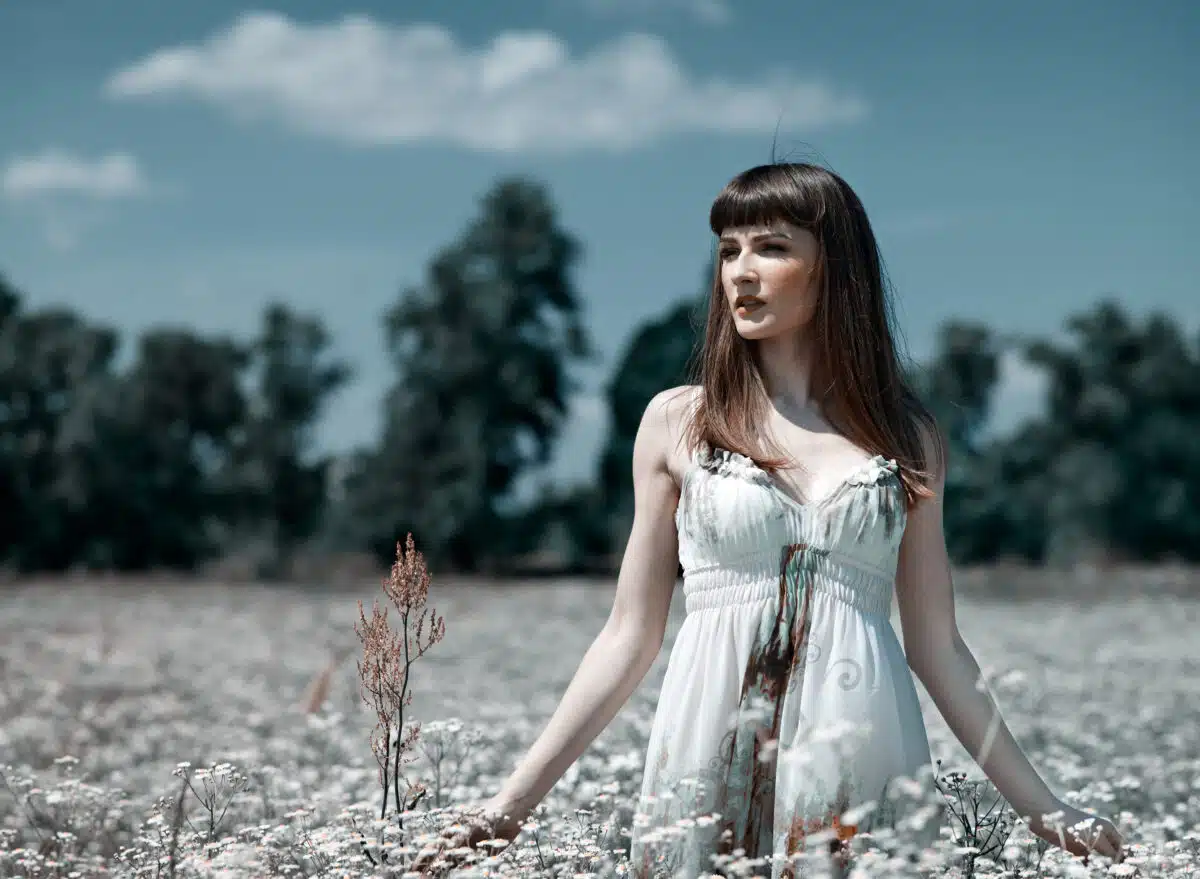
“Under the Hunter’s Moon” by Madison Julius Cawein
White from her chrysalis of cloud,
The moth-like moon swings upward through the night;
And all the bee-like stars that crowd
The hollow hive of heav’n wane in her light.
Along the distance, folds of mist
Hang frost-pale, ridging all the dark with gray;
Tinting the trees with amethyst,
Touching with pearl and purple every spray.
All night the stealthy frost and fog
Conspire to slay the rich-robed weeds and flowers;
To strip of wealth the woods, and clog
With piled-up gold of leaves the creek that cowers.
I seem to see their Spirits stand,
Molded of moonlight, faint of form and face,
Now reaching high a chilly hand
To pluck some walnut from its spicy place:
Now with fine fingers, phantom-cold,
Splitting the wahoo’s pods of rose, and thin
The bittersweet’s balls o’ gold ,
To the coal-red berries packed within:
Now on dim threads of gossamer
Stringing pale pearls of moisture; necklacing
The flow’rs; and spreading cobweb fur,
Crystaled with stardew, over everything:
While ‘neath the moon, with moon-white feet,
They go and, chill, a moon -soft music draw
From wan leaf- cricket flutes-the sweet,
Sad dirge of Autumn dying in the shaw.
From “Hibiscus and Salvia Flowers” by D. H. Lawrence
I long to see its chock-full crowdedness
And glutted squirming populousness on fire
Like a field of filthy weeds
Burnt back to ash,
And then to see the new, real souls sprout up.
Not this vast rotting cabbage patch we call the world;
But from the ash-scarred fallow
New wild souls.
Nettles, and a rose sprout,
Hibiscus, and mere grass,
Salvia still in a rage
And almond honey-still,
And fig-wort stinking for the carrion wasp;
All the lot of them, and let them fight it out.
But not a trace of foul equality,
Nor sound of still more foul human perfection.
You need not clear the world like a cabbage patch for me;
Leave me my nettles,
Let me fight the wicked, obstreperous weeds myself, and put them in their place,
Severely in their place.
I don’t at all want to annihilate them,
I like a row with them,
But I won’t be put on a cabbage-idealistic level of equality with them.
“Nightfall” by Madison Julius Cawein
O day, so sicklied o’er with night!
O dreadful fruit of fallen dusk!—
A Circe orange, golden-bright,
With horror ’neath its husk.—
And I, who gave the promise heed
That made life’s tempting surface fair,
Have I not eaten to the seed
Its ashes of despair!
O silence of the drifted grass!
And immemorial eloquence
Of stars and winds and waves that pass!
And God’s indifference!
Leave me alone with sleep that knows
Not anything that life may keep—
Not e’en the pulse that comes and goes
In germs that climb and creep.
Or if an aspiration pale
Must quicken there—oh, let the spot
Grow weeds! that dust may so prevail
Where spirit once could not!
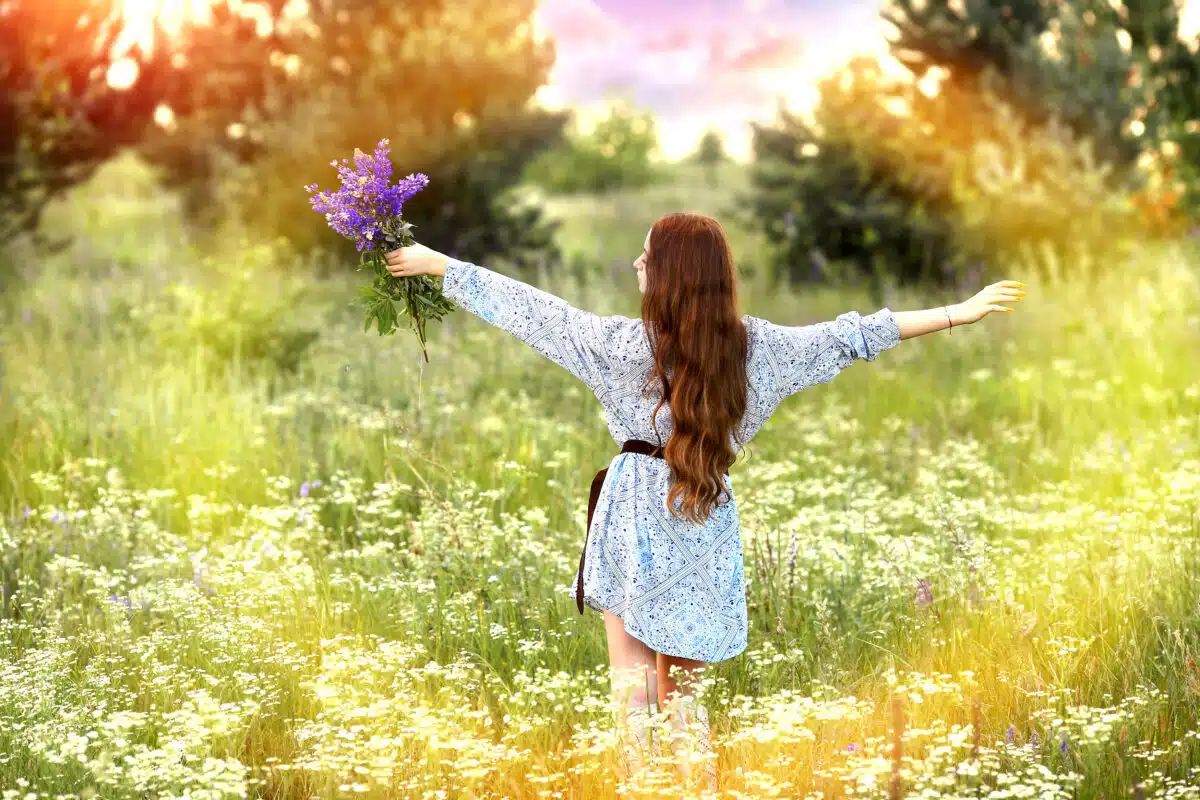
From “Odes” by George Santayana
IV
Slowly the black earth gains upon the yellow,
And the caked hill-side is ribbed soft with furrows.
Turn now again, with voice and staff, my ploughman,
Guiding thy oxen.
Lift the great ploughshare, clear the stones and brambles,
Plant it the deeper, with thy foot upon it,
Uprooting all the flowering weeds that bring not
Food to thy children.
Patience is good for man and beast, and labour
Hardens to sorrow and the frost of winter.
Turn then again, in the brave hope of harvest,
Singing to heaven.
Rhyming Poems About Weeds
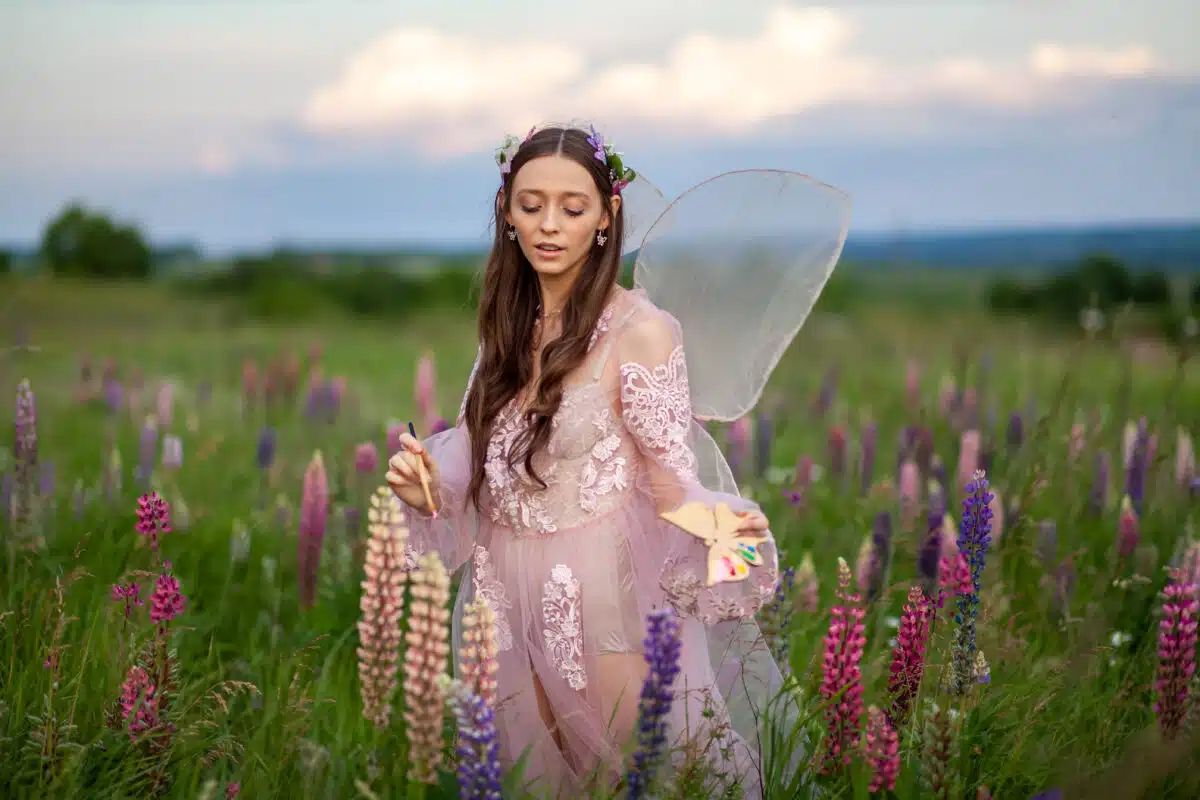
“A Threnody” by Madison Julius Cawein
I
The rainy smell of a ferny dell,
Whose shadow no sun-ray flaws,
When Autumn sits in the wayside weeds
Telling her beads
Of haws.
II
The phantom mist, that is moonbeam-kissed,
On hills where the trees are thinned,
When Autumn leans at the oak-root’s scarp,
Touching a harp
Of wind.
III
The cricket’s chirr ’neath brier and burr,
By leaf-strewn pools and streams,
When Autumn stands ’mid the dropping nuts,
With the book, she shuts,
Of dreams.
IV
The gray “Alas” of the days that pass,
And the hope that says “Adieu,”
A parting sorrow, a shriveled flower,
And one ghost’s hour
With you.
From “The Santa Fe Trail” by Vachel Lindsay
I find in the stubble of the new-cut weeds
A whisper and a feasting, all one needs:
The whisper of the strawberries, white and red
Here where the new-cut weeds lie dead.
But I would not walk all alone till I die
Without some life-drunk horns going by.
Up round this apple-earth they come
Blasting the whispers of the morning dumb:—
Cars in a plain realistic row.
And fair dreams fade
When the raw horns blow.
“On Stony Run” by Madison Julius Cawein
O cheerly, cheerly by the road,
And merrily down the hillet,
And where the bottom-lands are sowed
With bristle-bearded millet;
Then o’er a pebbled path it goes
Through woodland dale and dingle,
Unto a farmstead’s windowed rose,
And roof of moss and shingle.
Then darkly, darkly through the brush,
And dimly round the boulder,
Where cane and water-weeds grow lush,
Its current clear flows colder.
Then by the cedared way that leads,
Through burr and bramble-thickets,
Unto a burial-ground of weeds
Fenced in with broken pickets.
Then slowly, slowly down the vale,
And wearily through the rushes,
Where sunlight of the noon is pale,
Its shadowy water hushes.
For oft her young face smiled upon
Its deeps here, willow-shaded;
And oft with bare feet in the sun
Its shallows there she waded.
No more beneath the twinkling leaves
Shall stand the farmer’s daughter!—
softly past the cottage eaves,
O memory-haunted water!
No more shall bend her laughing face
Above it where the rose is!—
Sigh softly past the burial-place
Where all her youth reposes.
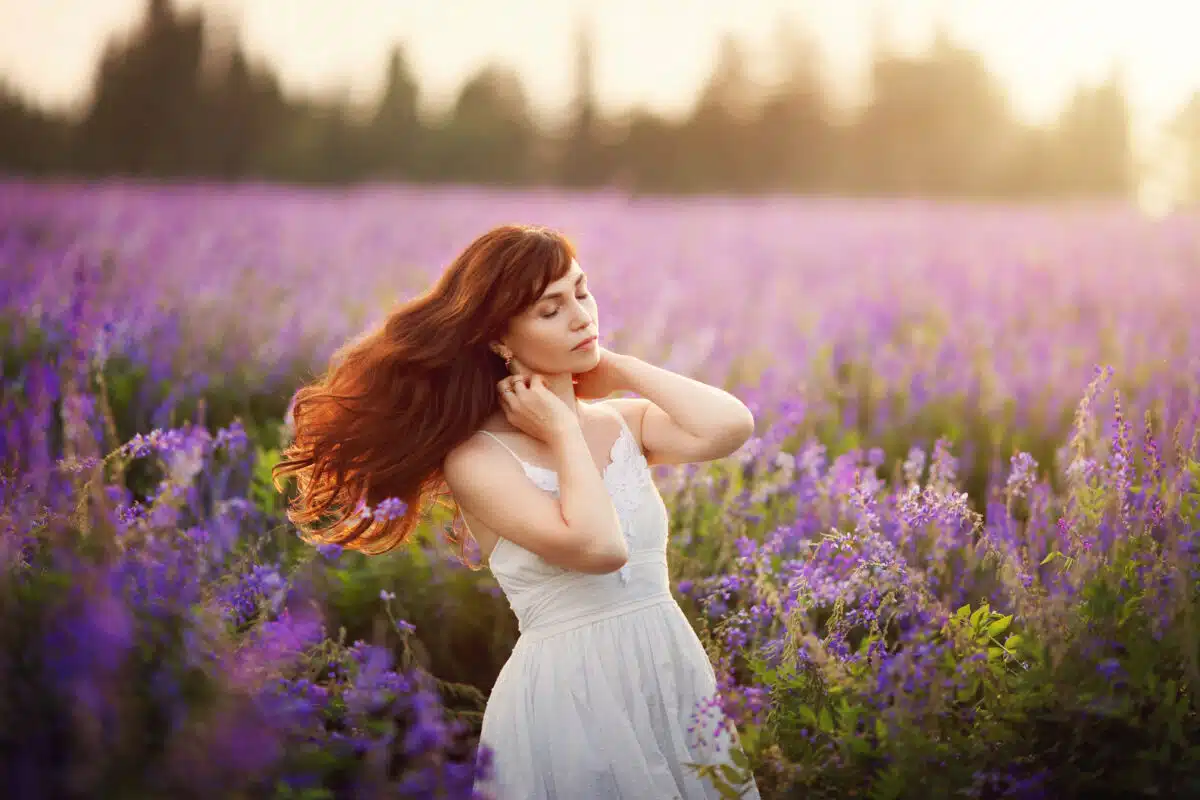
From “The Bridle-Path” by Madison Julius Cawein
I
Through meadows of the ironweeds,
Whose purple blooms hang, slipping
The morning dew in twinkling beads,
The thin path twists and, winding, leads
Through woodland hollows dripping;
Down to a creek of rocks and reeds;
On to a lilied dam that feeds
A mill, whose wheel through willow-bredes
Winks, the white water whipping.
II
It wends through meads of mint and brush
Where silvery seeds drift drowsy,
Or swoon along the heatful hush;
And where the bobwhite, in the bush,
The elder, blooming frowsy,
Keeps calling clear: then through a crush
Of crowded saplings, low and lush;
Then by a pool of flag and rush
With brier-rose petaled blowsy.
III
Thence, o’er the ragweed fallow-lot,
Whose low rail-fence encumbers
The dense-packed berries ripening hot;
Where, in the heaven, one far spot
Of gray, the gray hawk slumbers;
Then through the greenwood where the rot
Of leaves and loam smells cool; and, shot
With dotting dark, the touch-me-not
Swings curling horns in numbers.
“Young September” by Madison Julius Cawein
I
With a look and a laugh where the stream was flowing,
September led me along the land;
Where the goldenrod and lobelia, glowing,
Seemed burning torches within her hand.
And faint as the thistle’s or milkweed’s feather
I glimpsed her form in the sparkling weather.
II
Now ’twas her hand and now her hair
That tossed me welcome everywhere;
That lured me onward through the stately rooms
Of forest, hung and carpeted with glooms,
And windowed wide with azure, doored with green,
Through which rich glimmers of her robe were seen—
Now, like some deep marsh-mallow, rosy-gold;
Now, like the great Joe-Pye-weed, fold on fold
Of heavy mauve; and now, like the intense
Massed ironweed, a purple opulence.
III
Along the bank in a wild procession
Of gold and sapphire the blossoms blew;
And borne on the breeze came their soft confession
In syllabled musk and honey-dew;
In words unheard that their lips kept saying,
Sweet as the lips of children praying.
IV
And so, meseemed, I heard them tell
How here her loving glance once fell
Upon this bank, and from its azure grew
The ageratum mist-flower’s happy hue;
How from her kiss, as crimson as the dawn,
The cardinal-flow’r drew its vermilion;
And from her hair’s blond touch th’ elecampane
Evolved the glory of its golden rain;
While from her starry footsteps, redolent,
The aster pearled its flowery firmament.
“Feud” by Madison Julius Cawein
A mile of lane,—hedged high with ironweeds
And dying daisies,—white with sun, that leads
Downward into a wood; through which a stream
Steals like a shadow; over which is laid
A bridge of logs, worn deep with many a team,
Sunk in the tangled shade.
Far off a wood-dove lifts its lonely cry;
And in the sleepy silver of the sky
A gray hawk wheels scarce larger than a hand.—
From point to point the road grows worse and worse,
Until that place is reached where all the land
Seems burdened with some curse.
A ragged fence of pickets, warped and sprung,—
On which the fragments of a gate are hung,—
Divides a hill, the fox and ground-hog haunt,
A wilderness of briers; o’er whose tops
A battered barn is seen, low-roofed and gaunt,
’Mid fields that know no crops.
Fields over which a path, o’erwhelmed with burrs
And ragweeds, noisy with the grasshoppers,
Leads,—lost, irresolute as paths the cows
Wear through the woods,—unto a woodshed; then,
With wrecks of windows, to a huddled house,
Where men have murdered men.
A house, whose tottering chimney, clay and rock,
Is seamed and crannied; whose lame door and lock
Are bullet-bored; around which, there and here,
Are sinister stains.—One dreads to look around.—
The place seems thinking of that time of fear
And dares not breathe a sound.
Within, is emptiness: the sunlight falls
On faded journals papering its walls;
On advertisement chromos, torn with time
Around a hearth where wasps and spiders build.—
The house is dead: meseems that night of crime
It, too, was shot and killed.
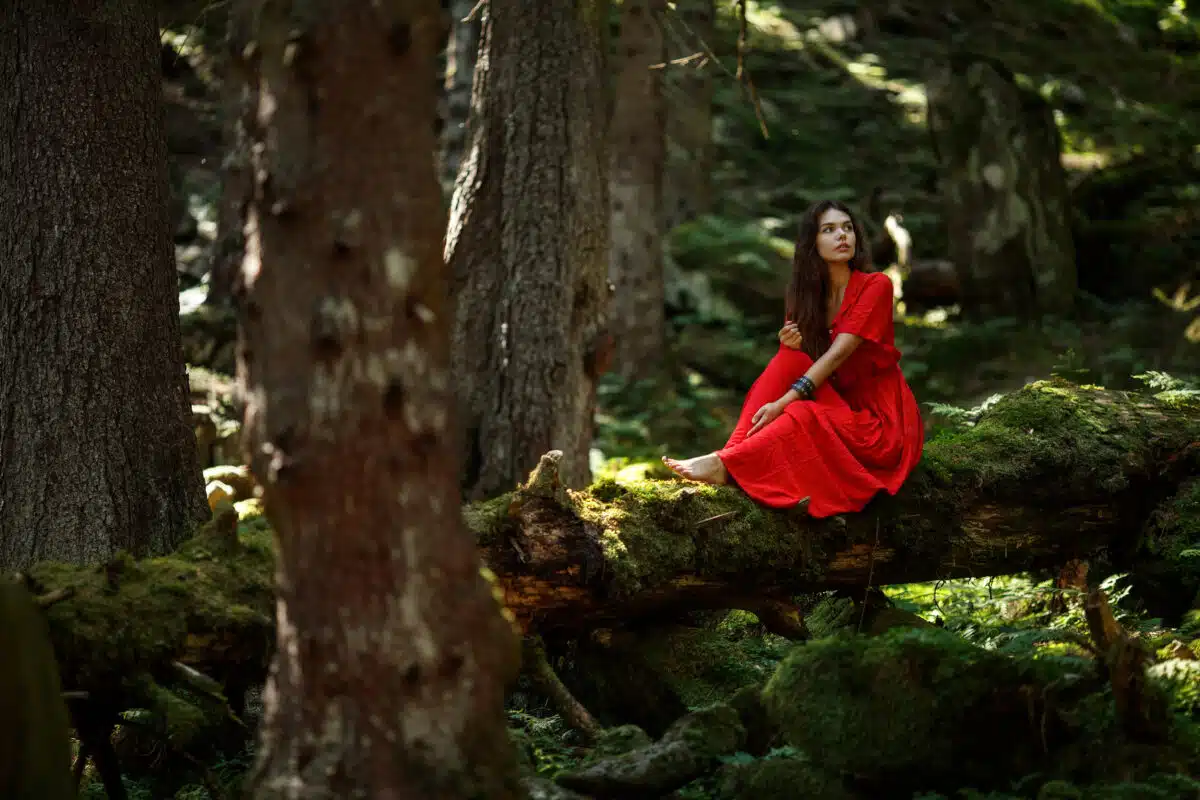
From “The Road Home” by Madison Julius Cawein
Over the hills as the pewee flies,
Under the blue of the southern skies;
Over the hills where the red-bird wings,
Like a scarlet blossom, or sits and sings;
Under the shadow of rock and tree,
Where the warm wind drones with the honeybee;
And the tall wild-carrots around you sway
Their lace-like flowers of cloudy gray:
By the black-cohosh and its pearl-white plume
A-nod in the woodland’s odorous gloom;
By the old rail-fence, in the elder’s shade,
That the myriad hosts of the weeds invade:
Where the butterfly-weed, like a coal of fire,
Blurs orange-red through brush and brier;
Where the pennyroyal and mint smell sweet,
And blackberries tangle the humming heat,
The old road leads; then crosses the creek,
Where the minnow dartles, a silvery streak;
Where the cows wade deep through the blue-eyed grass,
And the flickering dragon-flies gleaming pass.
“Sunset In Autumn” by Madison Julius Cawein
Blood-colored oaks, that stand against a sky of gold and brass;
Gaunt slopes, on which the bleak leaves glow of brier and sassafras,
And broom-sedge strips of smoky pink and pearl-gray clumps of grass
In which, beneath the ragged sky, the rain pools gleam like glass.
From west to east, from wood to wood, along the forest-side,
The winds,—the sowers of the Lord,—with thunderous footsteps stride;
Their stormy hands rain acorns down; and mad leaves, wildly dyed,
Like tatters of their rushing cloaks, stream round them far and wide.
The frail leaf-cricket in the weeds sounds its far fairy-bell;
And like a torch of phantom ray the milkweed’s windy shell
Glimmers; while, wrapped in withered dreams, the wet, autumnal smell
Of loam and leaf, like Fall’s own ghost, steals over field and dell.
The oaks, against a copper sky—o’er which, like some black lake
Of Dis, bronze clouds, (like surges fringed with sullen fire) break—
Loom sombre as Doom’s citadel above the vales that make
A pathway to a land of mist the moon’s pale feet shall take.
Now, dyed with burning carbuncle, a limbo-litten pane,
Red in wild walls of storm, the west opens to hill and plain,
On which the wild-geese ink themselves, a far triangled train;
And then the shuttering clouds close down—and night it comes again.
From “Drouth” by Madison Julius Cawein
III.
Dead! dead! all dead beside the drouth-burnt brook,
Shrouded in moss or in the shriveled grass.
Where waved their bells,—from which the wild-bee shook
The dew-drop once,—gaunt, in a nightmare mass,
The rank weeds crowd; through which the cattle pass,
Thirsty and lean, seeking some meagre spring,
Closed in with thorns, on which stray bits of wool
The panting sheep have left, that sought the cool,
From morn till evening wearily wandering.
